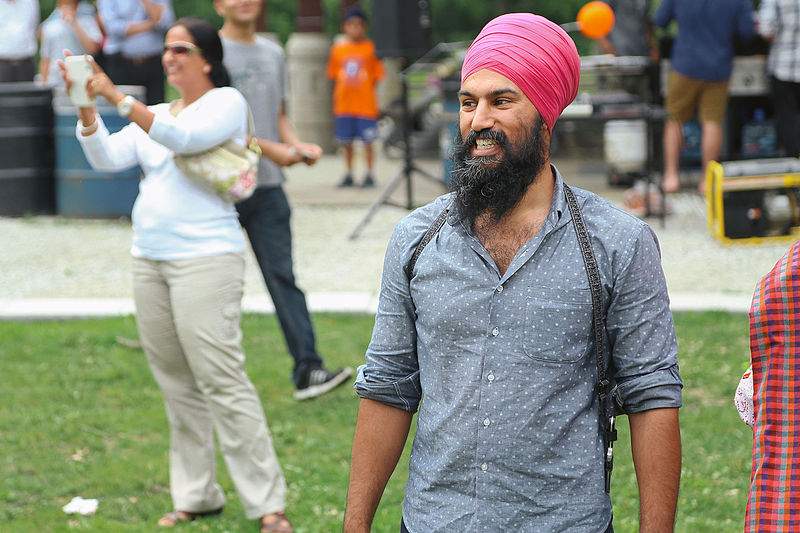The people behind the NDP leadership debates seem to be giving Canadians what the Conservative leadership race conspicuously lacked over a span of more than 18 months: good TV, interesting content.
With as many as 14 contenders elbowing each other on stage, the Conservative race was doomed from the outset to be a dreary, predictable enterprise of candidates pitching platitudinous soundbites to the party’s right-wing base.
The NDP has only five candidates on the set, which allows them to mix it up in longer exchanges. All of them are experienced parliamentarians, extremely well versed on the issues from a progressive perspective. And all of them are bilingual — again, an improvement over the overcrowded Conservative field.
You could tell by the way the other candidates went after Jagmeet Singh in Sunday afternoon’s debate in St. John’s that they regard him as the front-runner.
British Columbia MP Peter Julian, 55, was particularly critical of Singh for not opposing Kinder Morgan’s Trans Mountain pipeline — a project he said 60 per cent of British Columbians voted against in last month’s provincial election, soon to bring a minority NDP government to office. Julian also pointed out the federal NDP opposes Kinder Morgan.
Singh replied — politely but pointedly — that he would be meeting both BC NDP Leader John Horgan and Alberta NDP Premier Rachel Notley, who has endorsed the twinning of the existing Trans Mountain pipeline from Edmonton to Vancouver. In other words, Singh wants to avoid a fight in the NDP family.
Singh has been deputy leader of the Ontario NDP at Queen’s Park, a political arena renowned for high-sticking and elbowing in the corners. In the exchange with Julian he demonstrated what everyone in the provincial legislature already knew — that he can take a punch, and not just in the mixed martial arts bouts in which he has competed.
At 38, Singh has an interesting personal narrative: born in suburban Toronto of Punjabi immigrant parents, raised in St. John’s and Windsor, attended high school in Detroit. Somewhere along the way, he also learned French. A criminal defence lawyer, he’s been in the legislature since 2011 and is the only Sikh member there. He’s known as a stylish dresser — certainly the only NDP member who’s ever been featured in GQ.
Charlie Angus, who could emerge as a consensus second choice on the ranked ballot, also has a fascinating personal story. As a young man in Toronto in the 1980s, he cofounded two bands that recorded seven albums. He still sings and plays bass guitar, and launched his leadership campaign at the Toronto club where he used to hang out as a teenager.
As a Catholic social justice advocate, he founded a shelter for homeless men in Toronto. Returning to his birthplace of Timmins in the 1990s, he became a community activist. He’s been in the House since 2004. At 54, he’s the author of seven books, including Children of the Broken Treaty, a searing indictment of the treatment of First Nations children. Nobody in the House knows more about northern or aboriginal issues. His campaign slogan — “I’ve got your back” — is no idle boast. On Monday, he won the endorsement of the Public Service Alliance of Canada.
Niki Ashton, 34, from Churchill in northern Manitoba, is probably the most left leaning of the leadership candidates. When they were asked to comment on the Trudeau government’s foreign and defence policy reviews, Ashton jumped at the opportunity to lambaste the Liberals for promising $15 billion in new defence spending just to please Donald Trump. That’s a message that resonates in the NDP.
Guy Caron, 49, has been in the House from Rimouski since 2011 and, as the party’s former finance critic, is closer to the progressive centre of the NDP.
Several obvious candidates chose to sit out the race; Nathan Cullen, Alexandre Boulerice and Megan Leslie all had compelling family or career reasons not to jump in. But the five in the field all belong in it, and the NDP has done a good job of organizing the leadership campaign. Sunday’s debate was the fourth. All of have them have been interesting, especially when the candidates are asking each other questions in addition to the ones chosen from party members’ submissions. There are five more debates to come.
And at the end of the day, the NDP will prolong the suspense by having members vote each week in October until someone obtains a majority of preferential ballots (unlike the Conservatives, who rolled out 13 rounds in one day).
As always, the NDP faces an existential quandary — whether it’s enough to be the conscience of the country on the left, or whether it should broaden its base and play to win. From J.S. Woodsworth to Tommy Douglas, CCF and NDP leaders have endured Liberals hijacking their ideas, from pension plans to universal health care.
As the party’s former national director Robin Sears writes in a forthcoming Policy magazine article on the NDP, “this hits the most painful internal struggle faced by any party of principle of left or right. Is power and its necessary compromises more important than principle? Does being right always take precedence, even if the price is certain defeat?”
Ed Broadbent and Jack Layton both played to win. The NDP would do well to remember that. ![]()
Read more: Politics, Federal Politics















Tyee Commenting Guidelines
Comments that violate guidelines risk being deleted, and violations may result in a temporary or permanent user ban. Maintain the spirit of good conversation to stay in the discussion.
*Please note The Tyee is not a forum for spreading misinformation about COVID-19, denying its existence or minimizing its risk to public health.
Do:
Do not: